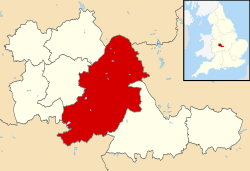Birmingham
| Birmingham | ||||||||
|---|---|---|---|---|---|---|---|---|
| City and Metropolitan borough | ||||||||
Clockwise, from top: skyline of Birmingham City Centre from the south; Birmingham Town Hall; St Martin's church and Selfridges department store in the Bull Ring; the University of Birmingham; St Philip's Cathedral; the Library of Birmingham.
|
||||||||
|
||||||||
| Etymology: Old English Beormingahām (home or settlement of the Beormingas) | ||||||||
Nickname(s):
|
||||||||
| Motto: Forward | ||||||||
 Birmingham shown within the West Midlands county |
||||||||
| Location within the United Kingdom | ||||||||
| Coordinates: 52°28′59″N 1°53′37″WCoordinates: 52°28′59″N 1°53′37″W | ||||||||
| Sovereign state | ||||||||
| Constituent country | ||||||||
| Region | West Midlands | |||||||
| Ceremonial county | ||||||||
| Historic county | ||||||||
| Settlement | c. 600 | |||||||
| Seigneurial borough | 1166 | |||||||
| Municipal borough | 1838 | |||||||
| City | 1889 | |||||||
| Metropolitan borough | 1 April 1974 | |||||||
| Administrative HQ | The Council House, Victoria Square |
|||||||
| Government | ||||||||
| • Type | Metropolitan borough | |||||||
| • Body | Birmingham City Council | |||||||
| • Lord Mayor | Shafique Shah (L) | |||||||
| • Council Leader | Sir Albert Bore, (L) | |||||||
| • Council Control | Labour | |||||||
| • MPs | ||||||||
| Area | ||||||||
| • City | 103.39 sq mi (267.77 km2) | |||||||
| • Urban | 231.2 sq mi (598.9 km2) | |||||||
| Elevation | 460 ft (140 m) | |||||||
| Population (2015 mid year estimate.) | ||||||||
| • City | 1,123,000 [1] | |||||||
| • Rank | 1st, English districts | |||||||
| • Density | 10,620/sq mi (4,102/km2) | |||||||
| • Urban | 2,440,986 (3rd) | |||||||
| • Metro | 3,701,107 (2nd) | |||||||
| Demonym(s) | Brummie | |||||||
| Time zone | GMT (UTC+0) | |||||||
| • Summer (DST) | BST (UTC+1) | |||||||
| Postcode | B | |||||||
| Area code(s) | 0121 | |||||||
| ISO 3166 code | GB-BIR | |||||||
| Ethnicity (2011 Census) [2] |
|
|||||||
| Primary Airport | Birmingham Airport | |||||||
| GDP | US$ 121.1 billion [3] | |||||||
| GDP per capita | US$ 31,572[3] | |||||||
| Website | Birmingham City | |||||||
Birmingham (![]() i/ˈbɜrmɪŋəm/) is a city and metropolitan borough in theWest Midlands, England. It is the largest and most populous British cityoutside London with 1,123,330 residents (2014 est.),[1] and its population increase of 88,400 residents between the 2001 and 2011 censuses was greater than that of any other British local authority.[4] The city lies within the West Midlands Built-up Area, the third most populousbuilt-up area in the United Kingdom with 2,440,986 residents (2011 census),[5] and its metropolitan area is the United Kingdom's second most populous with 3,701,107 residents (2012 est.) and is also the 9th largest metropolitan area in Europe.[6]
i/ˈbɜrmɪŋəm/) is a city and metropolitan borough in theWest Midlands, England. It is the largest and most populous British cityoutside London with 1,123,330 residents (2014 est.),[1] and its population increase of 88,400 residents between the 2001 and 2011 censuses was greater than that of any other British local authority.[4] The city lies within the West Midlands Built-up Area, the third most populousbuilt-up area in the United Kingdom with 2,440,986 residents (2011 census),[5] and its metropolitan area is the United Kingdom's second most populous with 3,701,107 residents (2012 est.) and is also the 9th largest metropolitan area in Europe.[6]
A medium-sized market town during the medieval period, Birmingham grew to international prominence in the 18th century at the heart of theMidlands Enlightenment and subsequent Industrial Revolution, which saw the town at the forefront of worldwide advances in science, technology and economic development, producing a series of innovations that laid many of the foundations of modern industrial society.[7] By 1791 it was being hailed as "the first manufacturing town in the world".[8] Birmingham's distinctive economic profile, with thousands of small workshops practising a wide variety of specialised and highly skilled trades, encouraged exceptional levels of creativity and innovation and provided a diverse and resilient economic base for industrial prosperity that was to last into the final quarter of the 20th century.[9] Its resulting high level of social mobility also fostered a culture of broad-based political radicalism, that under leaders from Thomas Attwood toJoseph Chamberlain was to give it a political influence unparalleled in Britain outside London, and a pivotal role in the development of British democracy.[10] From the summer of 1940 to the spring of 1943, Birmingham was bombed heavily by the German Luftwaffe in what is known as the Birmingham Blitz. The damage done to the city's infrastructure led to extensive redevelopment in subsequent decades.
Today Birmingham's economy is dominated by the service sector.[11]The city is a major international commercial centre, ranked as a beta− world city by the Globalization and World Cities Research Network;[12]and an important transport, retail, events and conference hub. Itsmetropolitan economy is the second largest in the United Kingdom with aGDP of $121.1bn (2014),[3] and its six universities make it the largest centre of higher education in the country outside London.[13]Birmingham's major cultural institutions – including the City of Birmingham Symphony Orchestra, the Birmingham Royal Ballet, theBirmingham Repertory Theatre, the Library of Birmingham and theBarber Institute of Fine Arts – enjoy international reputations,[14] and the city has vibrant and influential grassroots art, music, literary and culinaryscenes.[15] Birmingham is the fourth-most visited city in the UK by foreign visitors.[16]
People from Birmingham are called 'Brummies', a term derived from the city's nickname of 'Brum'. This originates from the city's dialect name,Brummagem,[17] which may in turn have been derived from one of the city's earlier names, 'Bromwicham'.[18] There is a distinctive Brummieaccent and dialect.













